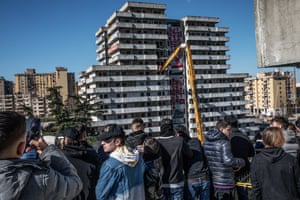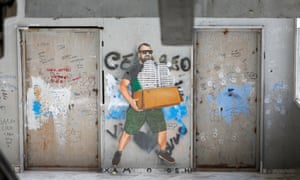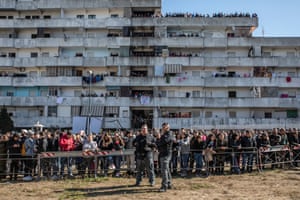Sail-shaped towers in Naples were for years a drugs hotspot and scene of mafia wars
Lorenzo Tondo in Naples @lorenzo_tondo Thu 20 Feb 2020

Young residents watch the demolition of the so-called Green Vela, one of the four sail-shaped tower blocks in the Scampia housing estate. Photograph: Alessio Mamo/The Guardian
Bulldozers have begun tearing down one of the four sail-shaped tower blocks in the Scampia housing estate in Naples, one of the biggest drug-dealing centres in Europe and the setting for the Italian TV drama Gomorrah.
For decades these run-down apartment blocks have been the scene of bloody wars between Camorra clans. Local authorities have described the demolition as a historic moment for the city. A special claw crane, 50 metres tall and weighing 130 tonnes, is being employed to raze three of the buildings, which were a symbol not only of criminality but also of the failures of Italy’s postwar dream of social housing.
TV crews from every part of the world descended on Scampia to film the “fall of Gomorrah”. Meanwhile, former inhabitants observed the destruction of their homes in silence.
Television crews from every part of the world have descended upon Scampia to film what has been described as the ‘fall of Gomorrah’. Photograph: Alessio Mamo/The Guardian
For 30 years the residents were forced into silence by the criminal clans, looked upon with indifference by the press and hounded by the police. Despite acknowledging the need to raze an uninhabitable area of the city, some residents could not hide their sadness as they witnessed the buildings’ demise.
“It is as if they were demolishing a piece of my life,” said Anna De Martino, 53. “My daughter and my grandchild, who is only three years old, were born in this vela (sail). He is still too small to understand, but this morning he asked me to take the house we had here and bring it to the temporary house where we live today.”
Bulldozers have begun tearing down one of the four sail-shaped tower blocks in the Scampia housing estate in Naples, one of the biggest drug-dealing centres in Europe and the setting for the Italian TV drama Gomorrah.
For decades these run-down apartment blocks have been the scene of bloody wars between Camorra clans. Local authorities have described the demolition as a historic moment for the city. A special claw crane, 50 metres tall and weighing 130 tonnes, is being employed to raze three of the buildings, which were a symbol not only of criminality but also of the failures of Italy’s postwar dream of social housing.
TV crews from every part of the world descended on Scampia to film the “fall of Gomorrah”. Meanwhile, former inhabitants observed the destruction of their homes in silence.

Television crews from every part of the world have descended upon Scampia to film what has been described as the ‘fall of Gomorrah’. Photograph: Alessio Mamo/The Guardian
For 30 years the residents were forced into silence by the criminal clans, looked upon with indifference by the press and hounded by the police. Despite acknowledging the need to raze an uninhabitable area of the city, some residents could not hide their sadness as they witnessed the buildings’ demise.
“It is as if they were demolishing a piece of my life,” said Anna De Martino, 53. “My daughter and my grandchild, who is only three years old, were born in this vela (sail). He is still too small to understand, but this morning he asked me to take the house we had here and bring it to the temporary house where we live today.”
Photograph: Fabio Sasso/Zuma/Rex/Shutterstock
Some inhabitants of the so-called green vela that was bulldozed on Thursday have been transferred to new apartments and others have been temporarily transferred to the only one of the four buildings that will remain standing. That building will be renovated.
“I was born and I got married on this vela,” said Rosa Amato, 25. “Despite the TV series and the films, people lived here – real people, with real stories. Here today, a piece of my history dies.”
Built between 1965 and 1980 by the architect Francesco di Salvo, le Vele (the Sails) were designed to replace the slums and squalor of the medieval city centre of Naples. Seven apartment blocks were built; three were demolished between 1998 and 2003).
The idea was to recreate housing complexes in the outskirts of Naples that would evoke the narrow alleyways of the “old city” to encourage community relations, and create infrastructure and green spaces for the poor.
Di Salvo’s dreams were quickly dashed as funds were siphoned into private pockets. Many of the blocks were left unfinished and the alleyways that di Salvo hoped to create were soon transformed into a warren for dealing heroin and evading the police. Scampia became Gomorrah and the Vele its fortress.
Some inhabitants of the so-called green vela that was bulldozed on Thursday have been transferred to new apartments and others have been temporarily transferred to the only one of the four buildings that will remain standing. That building will be renovated.
“I was born and I got married on this vela,” said Rosa Amato, 25. “Despite the TV series and the films, people lived here – real people, with real stories. Here today, a piece of my history dies.”
Built between 1965 and 1980 by the architect Francesco di Salvo, le Vele (the Sails) were designed to replace the slums and squalor of the medieval city centre of Naples. Seven apartment blocks were built; three were demolished between 1998 and 2003).
The idea was to recreate housing complexes in the outskirts of Naples that would evoke the narrow alleyways of the “old city” to encourage community relations, and create infrastructure and green spaces for the poor.
Di Salvo’s dreams were quickly dashed as funds were siphoned into private pockets. Many of the blocks were left unfinished and the alleyways that di Salvo hoped to create were soon transformed into a warren for dealing heroin and evading the police. Scampia became Gomorrah and the Vele its fortress.
Photograph: Alessio Mamo/The Guardian
In 2006, Roberto Saviano wrote a book that would change the history of the Camorra and that of Scampia. His revelations of the brutality and business deals of the Neapolitan clans shone an international light on the local mafia. The book was titled Gomorrah, a pun on the Camorra and the sinful Biblical city.
The degradation of the Vele continued to make news around the world when in 2008 Saviano’s book became the subject of a film directed by Matteo Garrone, and then in 2014 a crime drama TV series. The Vele would become the backdrop for the power struggles of Genny Savastano, Ciro Di Marzio and Don Patrizia, fictional characters inspired by real criminals.
In time, the residents of Scampia began to grow tired of the degradation that was synonymous with poverty and organised crime and started campaigning for new apartments to be built.
“I lived in one of these buildings in Scampia for 20 years and, believe me, we had enough of all the people who slandered us, saying we were the inhabitants of Gomorrah,” said Lorenzo Liparulo, one of the leaders of the residents’ association. “There are people here who lived with dignity, despite everything.”
Last year the authorities announced the demolition plans. The work was held up when workers found tonnes of asbestos.
In 2006, Roberto Saviano wrote a book that would change the history of the Camorra and that of Scampia. His revelations of the brutality and business deals of the Neapolitan clans shone an international light on the local mafia. The book was titled Gomorrah, a pun on the Camorra and the sinful Biblical city.
The degradation of the Vele continued to make news around the world when in 2008 Saviano’s book became the subject of a film directed by Matteo Garrone, and then in 2014 a crime drama TV series. The Vele would become the backdrop for the power struggles of Genny Savastano, Ciro Di Marzio and Don Patrizia, fictional characters inspired by real criminals.
In time, the residents of Scampia began to grow tired of the degradation that was synonymous with poverty and organised crime and started campaigning for new apartments to be built.
“I lived in one of these buildings in Scampia for 20 years and, believe me, we had enough of all the people who slandered us, saying we were the inhabitants of Gomorrah,” said Lorenzo Liparulo, one of the leaders of the residents’ association. “There are people here who lived with dignity, despite everything.”
Last year the authorities announced the demolition plans. The work was held up when workers found tonnes of asbestos.
the roof of facing buildings.
Photograph: Alessio Mamo/The Guardian
“It is a beautiful day for all of our city and Italy,” said the mayor of Naples, Luigi de Magistris, at a press conference before the demolition began.
Time will soon be up for the Vele but in order to destroy the real Gomorrah much more time will be needed. For years a banner hanging from one of the buildings read: “When the winds of oppression cease, the sails will be unfurled toward happiness.”
A new banner hanging from the vela that began to be demolished on Thursday read: “This is only the beginning.”
“It is a beautiful day for all of our city and Italy,” said the mayor of Naples, Luigi de Magistris, at a press conference before the demolition began.
Time will soon be up for the Vele but in order to destroy the real Gomorrah much more time will be needed. For years a banner hanging from one of the buildings read: “When the winds of oppression cease, the sails will be unfurled toward happiness.”
A new banner hanging from the vela that began to be demolished on Thursday read: “This is only the beginning.”



No comments:
Post a Comment